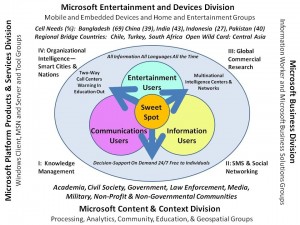A WSJ Investigation finds that iPhone and Android apps are breaching the privacy of smartphone users
By SCOTT THURM and YUKARI IWATANI KANE
Wall Street Journal, Sunday, December 18, 2010
Few devices know more personal details about people than the smartphones in their pockets: phone numbers, current location, often the owner's real name—even a unique ID number that can never be changed or turned off.
These phones don't keep secrets. They are sharing this personal data widely and regularly, a Wall Street Journal investigation has found.
An examination of 101 popular smartphone “apps”—games and other software applications for iPhone and Android phones—showed that 56 transmitted the phone's unique device ID to other companies without users' awareness or consent. Forty-seven apps transmitted the phone's location in some way. Five sent age, gender and other personal details to outsiders.
The findings reveal the intrusive effort by online-tracking companies to gather personal data about people in order to flesh out detailed dossiers on them.
Read full article and watch short demonstration video….

Phi Beta Iota: We continue to advocate simple cellular phones with call center services as the intermediary between the cloud and the person. Privacy is a good and should be commoditized under the control of the individual. Similarly, content should be copyright at the point of creation, and call centers used to make it available with the Application Oriented Network (AON) controls and privileges that CISCO continues to refuse to provide to individuals. Eventually brains will be hard-wired into the cloud–in the meantime, it is faster, better, and cheaper to use low-cost human brains in call centers as the educated responsive reliable filters that proprietary software and hardware cannot be.
UPDATED WITH CONTRIBUTIONS FROM MICHAEL GRUBE
Michael Grubbe: “Just a few thoughts: 1) Privacy itself is probably not a commodity. The information is the commodity. Private information is the term we associate with personal information that we share with a relatively small number of people. Computer innovations make a lot of personal information that most people don't even think about valuable because methods exist that allow whoever holds the data to predict the behavior of the person or thing the data is collected from. 2) The Android operating system at least asks a user before they install a program about a list of phone features applications will be using(in a manner similar to Facebook). The user then either gives consent or cancels the installation. I know this solution is kind of a cop out, but it's not quite as bad as the article makes it sound – at least not on Android. 3) Advocating simpler devices just to be protective seems like bad logic to me. What do you mean by call centers? Instead of calling(most likely in vain) for people to stop buying smart phones, it would be better to look for a group of people who want to develop ways to protect the privacy of people using the phones. 4) Your approach of using copyright as a means of protecting privacy is clever, but using creative commons licensing would be more suitable, don't you think?”
Robert David Steele Vivas Mike, can I add your comments, with attribution unless not desired, to the original post? A useful exchange. I still remember being impressed with Steve Case in 1994 when he took on Compuserv, which “owned” the 10% using computers, and sa…id something along the lines of “I'm going for the other 90%.” I am going for the five billion that eveyone else is ignoring. They can create infinite wealth for us all. Call centers are how you handle the cloud including its massive energy requirement, and how you leverage human brains as collective computing, all capable of petaflop calculations per second that NSA still cannot get a grip on despite its trillions in wasted money.
Michael Grube: “Feel Free! The point I was going for with the smart phones was that (and I unfortunately forgot the source that I saw this in) they are following the same pricing/power trends as the personal computer. So in 10 max years they will be affordable to many many more people. Is that an acceptable solution for me? Nope. But I think we can count on at least that happening barring some larger catastrophe. Quite honestly I think a much, much bigger concern should be simply giving all humans on the planet internet access and the basic literacy they need to navigate around the web . Access to information and how you use that information will probably determine your well being this century.”




